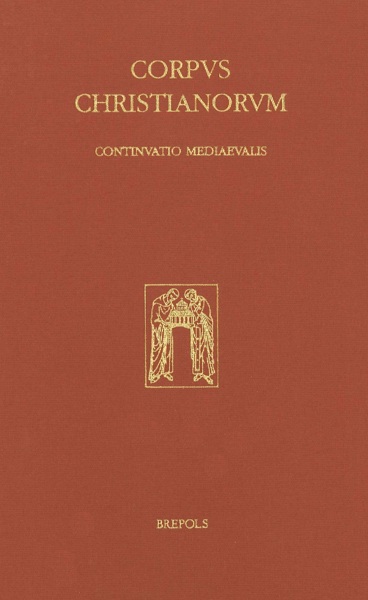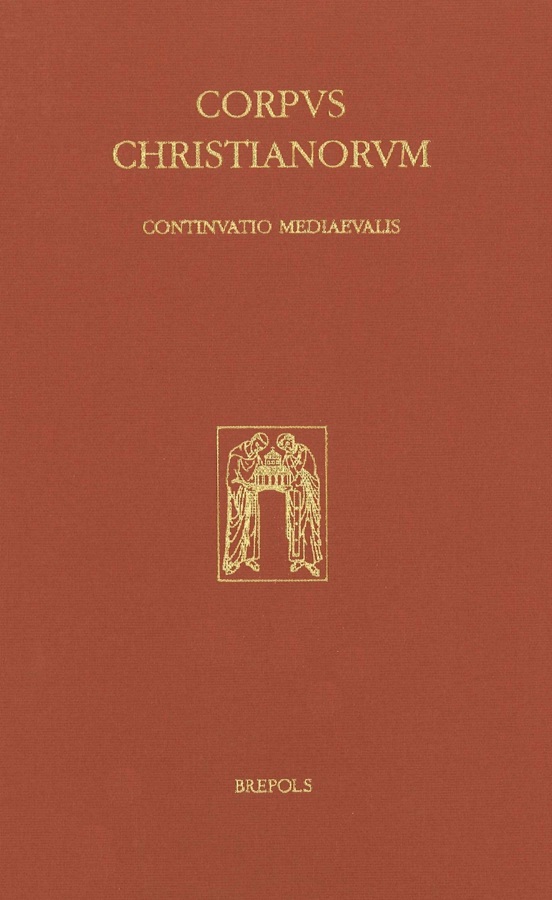
Iohannes Scottus Eriugena
Carmina, De imagine
Michael W. Herren, Andrew Dunning, Chiara O. Tommasi, Giovanni Mandolino (eds)
- Pages: clvii + 201 p.
- Size:155 x 245 mm
- Illustrations:5 col.
- Language(s):English, Latin, Greek
- Publication Year:2020
- € 205,00 EXCL. VAT RETAIL PRICE
- ISBN: 978-2-503-55174-6
- Hardback
- Available
"Ingesamt liefert der Band natürlich einen wichtigen Beitrag zur Eriugena- und Frühmittelalterforschung (...) Somit wird aber auch der Patristiker und Althistoriker auf seine Kosten kommen, indem er ein immens intteressantes Kapitel der Rezeptionsgeschichte der für ihn relevanten Texte äußerst facettenreich vor Augen geführt bekommt" (Benjamin Gleede, in Mittellateinisches Jahrbuch 56/3, 2021, p. 546-550)
"L’édition critique des poèmes de Jean Érigène et de sa traduction latine du De imagine de Grégoire de Nysse que la collection du Corpus christianorum Continuatio mediaevalis publie en un seul volume, révèle l’un des traits saillants du profil intellectuel de ce savant majeur de l’époque carolingienne : son amour du grec, qui l’a mené à la traduction de la patristique grecque en latin. (...) Les deux éditions serviront aux chercheurs travaillant sur les stratégies de traduction employées par Jean Scot et sur la connaissance du grec à l’époque carolingienne, questions qui passionnent toujours les historiens du haut Moyen Âge." (Kristina Mitalaité, dans Revue des Sciences philosophiques et théologiques 105/1, 2021, p. 123-126)
« La pensée de Jean Scot Érigène a reçu une attention plus soutenue depuis la deuxième moitié du XXe siècle et plus encore en ce début de XXIe siècle. Le médiéviste Michael W. Herren, spécialiste de la pensée latine du haut Moyen Âge, avec Andrew Dunning pour les poèmes et Giovanni Mandolino pour la traduction latine érigénienne de traité grec De la création de l’homme de Grégoire de Nysse, achèvent ici le dernier volume de l’édition complète des œuvres de Jean Scot Érigène dans la collection CCCM.
L’édition des poèmes dans le CCCM est une révision de l’édition, assortie d’une traduction et d’un commentaire, publiée pour l’Institute for Advanced Studies de Dublin (Scriptores latini Hiberniae 12, 1993) (…) l’édition de Brepols ne saurait totalement se substituer à la première édition. En revanche, il demeure que l’édition Brepols, du fait de la révision du texte et de la richesse de l’apparat critique, est indispensable.
La seconde partie de l’ouvrage est l’édition de la traduction latine du De opificio hominis de Grégoire de Nysse qu’Érigène traduit sous le titre De imagine. L’édition de cette traduction (avec introduction par Chiara Ombretta Tommasi) complète l’édition des traduction érigéniennes : le corpus dionysien, ainsi que les Ambigua ad Iohannem et les Quaestiones ad Thalassium de Maxime le Confesseur.
L’édition de ces deux textes d’Érigène constitue un ouvrage de qualité, dans lequel, outre le travail d’introduction et d’édition, les index, les références bibliographiques, les citations ont été très soignés. Il s’agit également d’un excellent outil de travail, tant pour les philosophes que pour les théologiens, les historiens et les spécialistes de littérature latine. » (Isabelle Moulin, dans : Cahiers de Civilisation médiévale, 65, 2022, p. 198-200)
Michael Herren is a specialist in early medieval Latin literature. He has produced critical editions/translations of the Hisperica Famina, Aldhelm's prose writings, and the Cosmography of Aethicus Ister. He is also the founding editor of The Journal of Medieval Latin.
Andrew Dunning is a Mellon Research Fellow at the Pontifical Institute of Mediaeval Studies, Toronto.
Chiara Ombretta Tommasi, former pupil of the Scuola Normale Superiore and PhD in Greek and Latin Philology, is now associate professor of History of Religions at the University of Pisa. Her interests focus on Late Antiquity (Christianity and the encomiastic poetry of the fifth and sixth centuries AD, aspects of Roman religion, as well as "esoteric" trends in Latin culture, such as Gnosticism, the Chaldaean Oracles, and Platonism). She has branched out and published some works dealing with the reception of ancient texts as well.
Giovanni Mandolino studied at the University of Pisa and at the Scuola Normale Superiore in Pisa (2011-2016), graduating on Eriugena's De imagine. He is currently a PhD student at the University of Padua, where he is working on Christian Arabic philosophy, especially Yahya ibn 'Adi. His interest for Eriugena resulted in the publication of an annotated translation of Eriugena's homily and commentary on the Gospel of John (CCT 31, Turnhout 2018).
John Scottus Eriugena's Carmina reflect not only his central philosophical and theological ideas, but also his literary education and his life at the court of Charles the Bald. This corpus of Eriugena's poetry includes recent discoveries of new items. Works laid under contribution by the poet have also been expanded.
De Imagine represents the Latin translation of Gregory of Nyssa's treatise on the creation of man (De opificio hominis), a text that had already attracted the attention of Dionysius Exiguus in the sixth century. Probably a juvenile work, it witnesses to Eriugena's interests for translating Greek texts and in this respect can be paralleled to major texts like the translation of Maximus the Confessor and of Dionysius the Areopagite. Moreover, large portions of the text were paraphrased or directly employed in the Periphyseon and, later on, were used by William of St Thierry in his De natura corporis et animae.
This new critical edition is based on the collation of the two extant manuscripts, compared against the Greek text, and is accompanied by a source apparatus that also highlights the reprises in Periphyseon and the parallel passages in De natura corporis. The introduction outlines the contents of the work, situating De imagine in Eriugena's speculation, and offers a thorough reconstruction of the manuscript tradition, which also includes the thorny question of the Greek exemplar employed by Eriugena.





